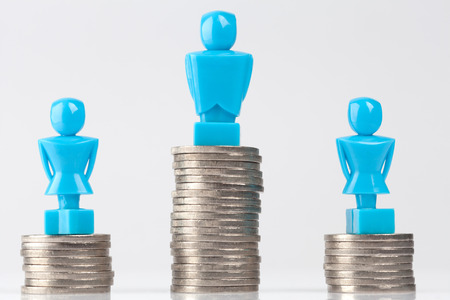
Copyright: gregbrave / 123RF Stock Photo
If there’s two things guaranteed to get people talking, it’s when the new Dr Who is revealed, and the BBC publishes its list of high-earning stars.
This year, these two massive events have happened in the same week, and while you might not care all that much who the latest inhabitant of the Tardis is, or what TV presenters and newsreaders earn, they both show the gender gap in all forms is still very much alive and kicking in 2017.
Whenever there’s a new Doctor, it always causes a huge debate about whether they’ll be as good as the last one. Some are seen as too young (Matt Smith) or too old (Peter Capaldi), or simply ‘not right for the role’, but the fact the latest incarnation is female has added further fuel to the fire, with gender prejudices playing a huge part this time.
The announcement of Jodie Whittaker as the nation’s favourite time lord, was greeted with a mix of opinions on social media. Many saw her casting as a ‘win for the PC brigade’, and said they would now stop watching the programme. There was even an online petition started to recast the role and give it to a man.
Of course, there were also many people who came out in support of the move, including Colin Baker, who played the sixth Doctor in the 1980s. There was also a clip of a young girl smiling with delight at the news that went viral on Twitter.
Now, onto those BB salaries…
For the first time, the BBC published the names of those who earn over £150,000 a year at the organisation in its annual report after MPs demanded it. Previously, these figures have been available following pressure from other media, and were met with criticism following the huge sums paid to Jonathan Ross and others.
The number of these mega-earners has been dramatically reduced today, as the latest figures show, with 96 people revealed to be bringing in this amount, which incidentally is just over the Prime Minister’s salary of £149,400.
And here’s where we start to see the gender pay gap – of the people named on the ‘talent’ list, 62 are men and 34 are women. For those raking in £250,000 or more, the numbers drop further with a mere nine women compared to 25 men.
There’s also a pay gap in some of the professions at the broadcaster. For example, Casualty’s top male actor, Derek Thompson, was paid between £350,000 and £400,000 during the last financial year while Amanda Mealing received somewhere between £250,000 and £300,000 over the same period as the show’s highest paid female star.
For news and current affairs programmes, the gap is even more glaring. Today presenter John Humphrys is paid £600,000 – £650,000 while his female counterparts don’t even make the list. BBC Breakfast host Louise Minchin is also absent, while male co-host Dan Walker does, although Walker has additional presenting duties. There are countless other examples on the list.
Overall, TV and radio presenter Chris Evans is the organisation’s biggest earner with a whopping £2.2 – £2.25m annual salary. Strictly presenter and Radio 2 host Claudia Winkleman is the biggest earning female, with a salary package revealed to be around £450,000 – £500,000 (less than half of Evans’), so there is still a lot of work to be done by the organisation to close the pay gap.
However, it’s worth noting many of those listed by the BBC are contractors and aren’t employed directly by the organisation, and the incomes don’t include work paid for by outside broadcast companies, which can push many of the salaries up.
Not all organisations are required to release their salary payments, but from next year (2018) all companies with more than 250 employees will have to publish the salaries and bonuses of all male and female staff to highlight any gaps in pay (it’s actually been against the law to pay men and women doing the same job differently since 1970).
However, being transparent about what people are paid within organisations of any size can help motivate individuals as they’ll feel they’re on an equal footing with colleagues, and see how much they’re valued. Adopting this approach also makes organisations think about how they’re spending money and whether they’re rewarding people fairly.
And who knows, by publishing the salaries of its stars, maybe the BBC will help re-ignite the gender pay gap debate, and there’ll be more higher-earning females not just on the next list, but in the workplace in general.
Let’s hope so.







